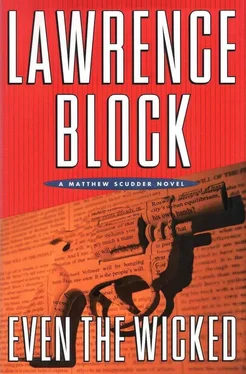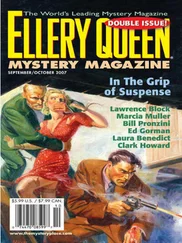I’d done all that, making amends, forgiving others and forgiving myself, systematically laying the ghosts of my own history. I didn’t rush into it the way some people do, but I kept working at it over time. There was a series of long talks with my sponsor, a lot of soul-searching, plenty of thought and a certain amount of action. And I would have to say it worked. Here was something that had haunted me for years, and now it doesn’t.
Except when it does, and that is most apt to happen around the time November starts to bleed into December. The days get shorter and shorter, the sun gives less and less light, and I start to remember every present I didn’t get around to buying, every argument I ever had, every nasty remark I ever made, and every night I found a reason to stay in the city instead of hauling my sad ass home to Syosset.
So when I’d walked home from my failed shopping spree I went not to the Parc Vendôme but to the hotel across the street. I told myself I couldn’t face a media gauntlet in the lobby, but in fact I had no reason to expect to encounter one. The reporters had understandably lost interest in the fellow who walked through them as if he was trying to get off the subway.
I said hello to Jacob behind the desk and exchanged nods with a fellow who spends most of his waking hours in the Northwestern’s faded lobby. The poor bastard moved into the hotel years before I did, and sooner or later he’ll die there. I don’t suppose he stands much chance of marrying a beautiful woman and moving across the street.
I went up to my room. I put the TV on, took a quick tour of the channels, and switched it off again. I pulled a chair over to the window and sat there, looking out at everything and nothing.
After a while I picked up the phone, made a call. Jim Faber answered the phone himself, saying “Faber Printing” in the gruff voice in which I have come to find considerable reassurance over the years. It was good to hear his voice now, and I said as much.
“Matter of fact,” I said, “just dialing your number made me feel better.”
“Well, hell,” he said. “I can remember times I’d be getting to the bar for the first one of the day, and really needing it. You know, feeling like I was going to jump right out of my skin?”
“I remember the feeling.”
“And once the drink was poured I could relax. I hadn’t had it yet, it wasn’t in my bloodstream spreading peace and love to every cell in my body, but just knowing it was there had the same effect. But what can be so bad that you’re actually driven to call your sponsor?”
“Oh, the joy of the season.”
“Uh-huh. Everybody’s favorite time of year. I don’t suppose you’ve been to a meeting within recent memory.”
“I left one about two hours ago.”
“That a fact. What’s keeping you busy these days, besides guilt and self-pity? You hot on the trail of Will’s replacement?”
“He’s got half the cops in town after him,” I said, “and all the reporters. He doesn’t need me.”
“Seriously? You’re not investigating the case?”
“Of course not. I’d just get in everybody’s way.”
“So what is it you’re doing, if you’re not doing that?”
“Nothing, really.”
“Well, there’s your answer,” he said. “Get off your ass and do something.”
He rang off. I hung up the phone and looked out the window. The city was still out there. I went out to take another crack at it.
I couldn’t do much in what was left of that afternoon. All I really managed was to figure out which people to see and what questions to ask them.
That would have to wait until morning. Meanwhile Elaine and I caught the new Woody Allen movie and listened to a piano trio at Iridium. Walking home, I told her the season was getting to me.
“Well, I’m not an alcoholic,” she said, “and I’m not even a Christian, and it gets to me. It gets to everybody. Why should you be different?”
“What drew me to you in the first place,” I said, “was your wonderfully incisive mind.”
“Rats. All these years I thought it was my ass.”
“Your ass,” I said.
“You can’t have forgotten it.”
“When we get home,” I said, “I’ll refresh my memory.”
In the morning I put on a suit and tie and went downtown to the Chase branch on Abingdon Square where Byron Leopold had done his banking. The bank officer I sat down with was a bright young woman named Nancy Chang. Early on she said, “I can’t help it, I have to ask. Does this have anything to do with the man who’s writing those letters?” I assured her it didn’t. “Because I recognized your name right away from the newspaper stories. You’re the man who broke the case.”
I said something appropriately modest, but for a change I wasn’t sorry for the recognition. It certainly greased the wheels, and I walked out of there with a photocopy of a check payable to Byron Leopold in the amount of $56,650. It was drawn on a bank in Arlington, Texas, and the name of the account was Viaticom.
“Viaticom,” I said. “Have you ever heard of an insurance company by that name?”
“No,” she said. “Is that what this is supposed to be? An insurance payment?”
“He cashed in a policy,” I said. “But this is more than the cash value would have amounted to, unless my source made a mistake in the amount. And Viaticom doesn’t sound like any insurance company I ever heard of.”
“It doesn’t, does it? You know what it sounds like? Some Silicon Valley outfit that makes software.”
I said, “Maybe the insurance company has a separate unit for policy redemption.”
“Maybe.”
“You sound dubious.”
“Well, it doesn’t look like any insurance company check that I ever saw,” she said, fingering the photocopy. “They’re all computer-generated these days, and usually machine-signed. This is all filled in by hand with a ballpoint pen. And it looks as though it was signed with the same pen, and by the same person.”
“Viaticom,” I said.
“Whatever that means. No address, just Arlington, Texas.”
“Wherever that is.”
“Well, I can tell you that much,” she said brightly. “It’s between Dallas and Fort Worth. Where the Rangers play?”
“Oh, of course.”
“See? You knew all along.” She grinned. “Are you going to have to fly down there? Or can you let your fingers do the walking?”
The 817 information operator had a listing for Viaticom. I’d have tried to wheedle the address out of her as well as the number, but before I could ask she shunted me to some digital recording that told, me, the, number, one, numeral, at, a, time. I can’t figure out how those things work, but I know better than to try reasoning with them.
I wrote down the number and dialed it, and when a woman answered and said, “Viaticom, good morning,” I had no trouble believing I was talking to somebody in Texas. It was all there in her voice — the boots, the big hair, the shirt with the pearl buttons.
“Good morning,” I said. “I wonder if I could get some information on your company. Could you tell me—”
“One moment please,” she said, and put me on hold before I could finish my sentence. At least I was spared the canned music. I held for a minute or two, and then a man said, “Hi, this is Gary. What can I do for you?”
“My name’s Scudder,” I said, “and I’d like to know something about your company.”
“Well, Mr. Scudder, what would you like to know?”
“For openers,” I said, “I wonder if you could tell me what it is that you do.”
There was a short pause, and then he said, “Sir, nothing would make me happier, but if there’s one thing I’ve learned it’s not to give interviews over the phone. If you want to come on over here I’ll be more than happy to accommodate you. You can bring your notebook and your tape recorder and I’ll kick back and tell you more than you maybe want to know.” He chuckled. “See, we welcome publicity, but every phone interview we’ve ever done’s turned into an unfortunate experience for us, so we just don’t do them anymore.”
Читать дальше












